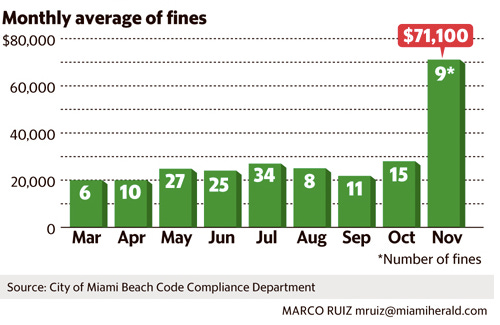Uber drivers get rules for unionizing, Airbnb racks up fines, and the dark side of self-driving beers
XXXVI
A quick note: I’ll be in SF next week for work. If you are also in SF and want to meet up, let me know.
Bargaining.
Seattle became the first city in the US to grant Uber drivers the right to unionize last December, and on Wednesday (Nov. 23) the city council released rules suggesting how they could go about it. So far everyone is upset. The key controversy is over the rule stating which ride-hailing drivers will get a say in unionizing. Uber and Lyft have argued that every driver should get a vote, presumably because the majority of their drivers work very few hours and would be less likely to support unionization in the first place. By the flip logic, the unions wanted only full-time drivers to weigh in, which they defined as people who completed 150 trips in the last 30 days. Seattle City Council went ahead and split the difference, proposing that any driver who has been with their company for 90 days and has made 52 trips in a three-month period over the last year should be eligible to vote. Both Uber/Lyft and the union organizers have reportedly slammed the proposal, so, you know, job well done.
Home-sharing.
Airbnb’s problems continue in cities around the world. A few examples from the last week:
Toronto: Convicted its first Airbnb property owner over zoning violations
Barcelona: Fined Airbnb and rival HomeAway €600,000 (about $635,000) apiece for advertising and renting out apartments to tourists without a license
New York: A rattled host kicked out the L.A. couple staying in his apartment, forcing Airbnb to issue a refund and the couple to spend $2,200 on a hotel
Miami Beach: The mayor thinks $20,000 fines on short-term rentals are not enough
Airbnb is at an odd moment. On the one hand, it’s looking forward: fresh off the Airbnb Open and a successful debut of Trips, the concierge-esque feature that initiates Airbnb’s transformation into a full-fledged travel company. On the other, it’s looking back: its core peer-to-peer rentals business is under siege in some of its biggest US markets as well as a handful of international cities. With its $30 billion valuation, Airbnb is probably able to weather the regulatory uncertainty and fines, but are its hosts, especially when those threats are coupled with complaints from their friends and neighbors? That seems less of a sure thing. See Elizabeth Agee, the New York host who attended a pro-Airbnb rally in late October only to declare, “that should be illegal!” when she learned how some short-term rentals worked. Or Daniel Sehres, the property owner in Miami Beach who spent $200,000 converting a historic five-bedroom into a bed-and-breakfast but who also admits of his neighbors’ gripes, “everyone comes here to do one thing: party.” After years of marketing home-sharing as a no-brainer, Airbnb is being forced to acknowledge that it’s actually quite a complicated issue. For better or worse, so are its hosts.
Parking lots.
Here is an interesting story from the Wall Street Journal on property developers who are trading parking spaces in buildings for ride-hailing perks. At Eleanor Apartments, a 41-unit complex in Los Angeles, residents now get $100 in Uber or Lyft credit every month instead of on-site parking spots. The owner previously tried parking a Zipcar in front of the building, but with another Zipcar station close by, it wasn’t ideal for the city or company. Green Street Advisors, a real-estate research firm, tells the Journal that parking needs will be cut in half over the next 30 years, eliminating about 75 billion square feet of parking. Lyft president John Zimmer has long said attending hotel school shaped his interest in transportation, making him realize how little the typical car was used by its owner. And both Lyft and Uber have made it a goal to get more people into fewer cars, talking often about ride-hailing’s potential to reshape cities. But it’s projects like Eleanor Apartments, where parking spots are actively being cut out of the picture, that make you realize it’s really happening.
Ripples.
A passage worth contemplating from Om Malik:
Otto, a Bay Area startup that was recently acquired by Uber, wants to automate trucking—and recently wrapped up a hundred-and-twenty-mile driverless delivery of fifty thousand cans of beer between Fort Collins and Colorado Springs. From a technological standpoint it was a jaw-dropping achievement, accompanied by predictions of improved highway safety. From the point of view of a truck driver with a mortgage and a kid in college, it was a devastating “oh, shit” moment. That one technical breakthrough puts nearly two million long-haul trucking jobs at risk. Truck driving is one of the few decent-paying jobs that doesn’t require a college diploma. Eliminating the need for truck drivers doesn’t just affect those millions of drivers; it has a ripple effect on ancillary services like gas stations, motels, and retail outlets; an entire economic ecosystem could break down.
I’ll just leave it at that.
Other stuff.
Airbnb drops lawsuit against New York state. Airbnb “ready to do our part” in New Orleans. Uber wants to reduce congestion in India. Uber drivers track air pollution in Mexico City. Uber deactivates New York drivers who advertise for Juno. Uber drivers join Fight for $15 protests. Careem nears $300 million in funding. Grab CFO leaves after just seven months. Sweden’s Electrolux explores Uber for laundry. Zenefits settles. EU fears populist backlash over Uber case in France. EU court wonders: What is Uber? How Otto Defied Nevada and Scored a $680 Million Payout from Uber. On-demand Christmas trees. Uber, but for amateur therapists. “Ridiculous” Massage Business Raising Millions of Dollars.





